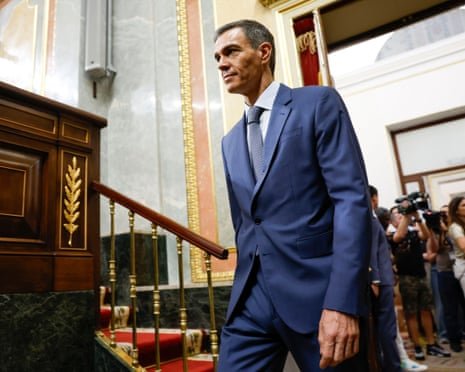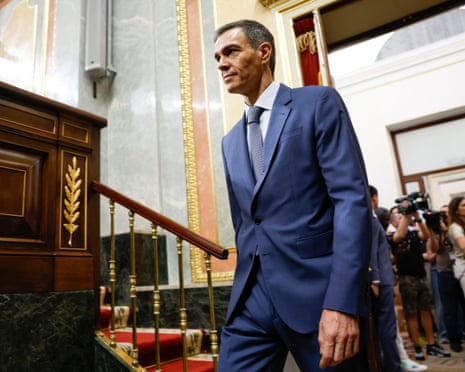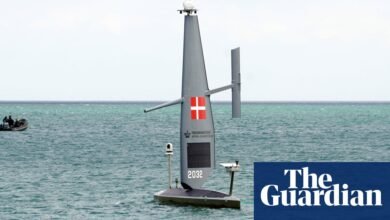Spanish PM rejects Nato’s ‘unreasonable’ 5% GDP target for defence spending – Europe live | Europe

Spain rejects ‘unreasonable, counterproductive’ push to increase Nato defence spending to 5% – reports
Spanish prime minister Pedro Sánchez has reportedly told Nato secretary general Mark Rutte that the proposed change of the alliance’s target for defence spending to 5% GDP “would not only be unreasonable, but also counterproductive,” as reported by the Spanish media.

In a letter responding to Rutte’s proposals for next week’s Nato summit in the Hague, first reported by the Spanish newspaper El País, Sánchez declared his opposition for the proposed change arguing “it is not necessary to fulfil our commitments to the alliance.”
He explained that the figure “has nothing to do with the level of commitment to collective defence,” with Spain confidence it can do enough with lower spending.
He added that adopting the target would have adverse effects for the Spanish economy, as it would force the government to raise taxes, cut public services and slow down its plans on green transition. “We choose not to make those sacrifices,” he reportedly said.
The paper said that the new Nato target had been expected to be adopted unanimously, but Spain’s objection could now trigger further discussions on its adoption.
A government source told El País that Spain did not want to “veto anything” for other countries, but make it clear “we can’t commit to it.”
The Spanish national broadcaster, RTVE, also reported on the letter.
The latest available set of Nato figures showed Spain at 1.3% GDP defence spending, the lowest of all members of the alliance. In April, the government unveiled reluctant plans to get up to 2%.
The clash comes at a tricky time for Sánchez, who is facing growing criticism at home over corruption allegations.
The main advocate of the new 5% target, US president Donald Trump, targeted Spain in his early comments on defence spending in January, when he wrongly said it was a member of the Brics grouping of nations, and that was the reason behind it not maintaining higher defence spending levels.
Key events
Reuters have had sight of the letter from the Spanish PM, Pedro Sánchez, to Nato chief Mark Rutte, asking him to exclude Spain from raising its defence spending target to 5% of GDP.
Sanchez requested a “more flexible formula” that either makes the spending target optional or excludes Spain from its application.
In the letter, Sánchez wrote:
Committing to a 5% target would not only be unreasonable, but also counterproductive, as it would move Spain further away from optimal spending and would hinder the EU’s ongoing efforts to strengthen its security and and defence ecosystem.
He added that the new target, proposed by the US, was “incompatible with our welfare state and our world vision”.
Instead, Madrid estimates it will need to spend 2.1% of GDP to meet the Spanish military’s estimated investment requirements, Sanchez said.
Spain rejects ‘unreasonable, counterproductive’ push to increase Nato defence spending to 5% – reports
Spanish prime minister Pedro Sánchez has reportedly told Nato secretary general Mark Rutte that the proposed change of the alliance’s target for defence spending to 5% GDP “would not only be unreasonable, but also counterproductive,” as reported by the Spanish media.
In a letter responding to Rutte’s proposals for next week’s Nato summit in the Hague, first reported by the Spanish newspaper El País, Sánchez declared his opposition for the proposed change arguing “it is not necessary to fulfil our commitments to the alliance.”
He explained that the figure “has nothing to do with the level of commitment to collective defence,” with Spain confidence it can do enough with lower spending.
He added that adopting the target would have adverse effects for the Spanish economy, as it would force the government to raise taxes, cut public services and slow down its plans on green transition. “We choose not to make those sacrifices,” he reportedly said.
The paper said that the new Nato target had been expected to be adopted unanimously, but Spain’s objection could now trigger further discussions on its adoption.
A government source told El País that Spain did not want to “veto anything” for other countries, but make it clear “we can’t commit to it.”
The Spanish national broadcaster, RTVE, also reported on the letter.
The latest available set of Nato figures showed Spain at 1.3% GDP defence spending, the lowest of all members of the alliance. In April, the government unveiled reluctant plans to get up to 2%.
The clash comes at a tricky time for Sánchez, who is facing growing criticism at home over corruption allegations.
The main advocate of the new 5% target, US president Donald Trump, targeted Spain in his early comments on defence spending in January, when he wrongly said it was a member of the Brics grouping of nations, and that was the reason behind it not maintaining higher defence spending levels.
Nato planning to scale down its summit to ‘ensure Trump did not get bored and leave early’ – report
Earlier today, I cheekily suggested that Ukrainian president Volodymyr Zelenskyy is probably wondering how to persuade US president Donald Trump to stay at the Nato summit in The Hague next week long enough to get to discussions on Ukraine and Russia – and not leave early, as he did at the G7 summit.
Well, looks like this issue may have actually influenced the planning.
The Financial Times newspaper is now reporting (£) that Nato has changed plans for the summit to scale it down from three days to … just “one two-and-a-half hour working session among the 32 leaders” to “ensure Trump did not get bored and leave early.”
“The entire point is to make it as small, and as focused as possible,” said one of the officials. “With as little scope for disruption.”
Liberal Budapest mayor says he will hold Budapest Pride march despite ban
But despite the ban, liberal Budapest mayor Gergely Karácsony vowed to still hold the gathering.
“Given that the city council did not make its announcement within the ambit of the law on gatherings, this ban has no value,” Karácsony wrote on Facebook, AFP noted.
In a post adorned by a picture of a rainbow unicorn, he ridiculed the ban saying the police might have just as well issued a ban affecting the legendary creatures, adding:
“Budapest city hall will organise the Budapest Pride march on 28 June as a city event. Period.”

Jennifer Rankin
The Hungarian ban on the Budapest pride march comes a day after a debate on the march was held at the European parliament, with dozens of lawmakers declaring their support and solidarity.
Iratxe García Pérez, the Spanish leader of the Socialist group in the European parliament, addressed gay people in Hungary directly during the debate on Wednesday: “We see you, we hear you and on 28 June we will march with you in Budapest, side by side, proud and loud.”
Tineke Strik, a Dutch Green MEP, who recently led a delegation of lawmakers to Hungary, said she and 70 European deputies would be in Budapest. “Me and 70 colleagues will do what the commission won’t. We will come to the Pride. We will show the Hungarians that they are not alone.”
Amsterdam’s mayor, Femke Halsema, and a junior Dutch minister have also said they will attend the event, according to local media.
The European commissioner for democracy and justice, the Irish politician Michael McGrath, who took part in the debate, did not respond to repeated requests to join the event in Budapest.
Hungarian police bans Budapest Pride march
Meanwhile, in Hungary, police say they are banning the Budapest Pride march planned for 28 June.
Hungary’s parliament, in which Viktor Orbán’s right-wing Fidesz Party has a big majority, passed legislation in March that created a legal basis for police to ban LGBTQ marches, citing the protection of children.
“The police, acting within their authority over public assemblies, prohibit the holding of the assembly at the aforementioned location and time,” the police said in a statement published on their website, adding that the decision could be appealed within three days at the country’s supreme court, AFP reported.
Finland votes to exit landmines treaty in response to growing Russia threat
Elsewhere, the Finnish parliament has just voted in favour of withdrawing from the Ottawa Convention that bans the use of anti-personnel landmines.
The move comes amid growing worries about Russia’s intentions in the region.
The vote was based on a government recommendation and a report from the foreign affairs committee, which argued that “the proposal to terminate the agreement is based on the needs of Finland’s defence in a weakened security policy situation.”
“With its aggressive military actions that violate international law, Russia has undermined the international rules-based system and endangered peace and stability in the Euro-Atlantic area. Large-scale and long-term warfare has returned to Europe. The risk of war expansion cannot be ruled out.”
The report noted that Finland’s long land border with Russia – over 1,300 km – makes it “particularly vulnerable to a large-scale attack.”
“Anti-personnel mines are not only a choice for technical reasons, but they are a strategic tool for strengthening Finland’s defence. The psychological effect – mine fear – is a key part of the deterrent effect of mines. The effect of mine fear cannot be replaced by other systems,” it explained.
157 lawmakers voted in favour of the proposal, with just 18 against.
Other countries in the region – Estonia, Latvia, Lithuania – have already made similar decisions, and Poland also signalled its support for the move.
Czech government survives vote of no confidence
Catching up with other news from last night, the Czech centre-right government on Wednesday survived a vote of no confidence, called after the acceptance of a payment to the state by an ex-convict worth $45 million in bitcoin sparked controversy within the ruling coalition months before an election, Reuters reported.
The biggest opposition party, ANO, which leads opinion polls ahead of an 3-4 October election, had filed a no-confidence motion against prime minister Petr Fiala’s government, accusing it of helping the former cybercriminal legitimise his bitcoin holdings of potentially illegal origin.
Reuters noted that the motion failed after two days of debate in the lower house, where Fiala’s ruling coalition led by his Civic Democrats Party, holds a majority.
The man who made the donation of 468 bitcoins to the state was in jail from 2017 until 2021 after being convicted of involvement in the drug trade, fraud and illegal possession of weapons for running an illegal drug market on the internet called Sheep Marketplace.
British, German and French foreign ministers plan meeting with Iranian counterpart

Patrick Wintour
The foreign ministers of the UK, France and Germany are planning to meet the Iranian foreign minister, Abbas Araghchi, in what could represent a potential diplomatic breakthrough after five days of Israeli bombing.
The meeting is due to take place in Geneva on Friday but final confirmation from Tehran is still pending; if confirmed it would represent the first face-to-face diplomatic meeting since Benjamin Netanyahu launched Israel’s attack on Iran’s military and nuclear sites.
Araghchi spoke to the three European foreign ministers by phone earlier this week, but has so far refused to meet with Donald Trump’s special envoy to the Middle East, Steve Witkoff, arguing that Israeli attacks across Iran were approved by the US. Araghchi has said it is impossible to meet Witkoff while the Iranians are under assault from Israel.
Before the planned Geneva meeting, the British foreign secretary, David Lammy, will meet the US secretary of state, Marco Rubio, in Washington for discussions focused “on addressing the current situation in the Middle East”.
The meeting would also be attended by the head of EU foreign affairs, Kaja Kallas.
The substance of Friday’s talks – which would be coordinated with the US – will focus on how Iran is willing to reduce or close its nuclear programme.
Russia spurns ceasefire and chooses to kill, Zelenskyy says
Ukrainian president Volodymyr Zelenskyy has just posted a video of his visit to the site of the Russian “vile attack” earlier this week, which killed 23 civilians.
This strike is a reminder to the world that Russia spurns a ceasefire and chooses to kill.
I am grateful to all our partners who understand that Ukraine must grow stronger every single day. I thank everyone who is ready to exert pressure on Moscow in a way that makes them feel the true cost of this war.
Putin ready to meet Zelenskyy in ‘final phase’ of talks, but defiant about aggression’s focus on military targets, progress made
For what it’s worth, Russia’s Vladimir Putin said on Thursday he was ready to meet with Ukrainian counterpart Volodymyr Zelenskyy but only during a “final phase” of negotiations “so as not to sit there and divide things up endlessly, but to put an end to it”.
But his broader comments were not really conciliatory, and will do little to raise hopes of a negotiated settlement.
In the course of his briefing with foreign media, Putin made his customary false accusation that Zelenskyy is not Ukraine’s legitimate president.
Asked by AP about Russia condemning Israel’s strikes on Iran even as Ukrainian civilians are killed in attacks by Moscow, Putin responded that Russia was targeting the country’s arms factories – despite a recent attack on a nine-story residential building, which saw several dead.
“The strikes were carried out against military industries, not residential quarters.”
Putin also warned Germany against delivering long-range Taurus missiles to Ukraine, saying that it could draw it into a direct military conflict with Russia but won’t help stem Russian advances, AP said.
“Our troops are advancing along the entire line of contact,” he said, warning Ukraine to accept Russia’s terms for a peace deal or face tougher conditions in the future. “If they fail to agree, the situation could change for the worse.”
On Nato, he added:
“We do not consider any Nato rearmament to be a threat to the Russian Federation, because we are self-sufficient in terms of ensuring our security.”
Courting Trump, he praised his push for peace in Ukraine, seconding the American leader’s repeated claims that the 3-year-old conflict wouldn’t have started if he had been in the White House in 2022, AP noted.
“If Trump had been the president, the conflict indeed might not have erupted.”
Morning opening: 100 days later

Jakub Krupa
US president Donald Trump had originally promised to stop the Russian invasion of Ukraine within 24 hours (or before!) of taking the office on 20 January.
Well, it’s been 149 days since then – and 100 days since Ukraine accepted the most recent US-backed offer of an unconditional ceasefire. Russian aggression, however, continues unabated.
Ukraine’s foreign minister Andrii Sybiha marked the occassion, saying “it has been exactly 100 days since Russia has been rejecting this basic first step towards peace.”
When Nato meets in The Hague for its annual summit next week, Ukraine’s Volodymyr Zelenskyy will be hoping Trump sticks around long enough for that item to make it on to the agenda.
European leaders may offer continued backing for Ukraine, but with the Israel-Iran situation evolving by the hour, it’s tough to know what will happen by the end of the day – never mind next week.
Whatever happens, I will bring you the latest here.
It’s Thursday, 19 June 2025, it’s Jakub Krupa here, and this is Europe Live.
Good morning.




